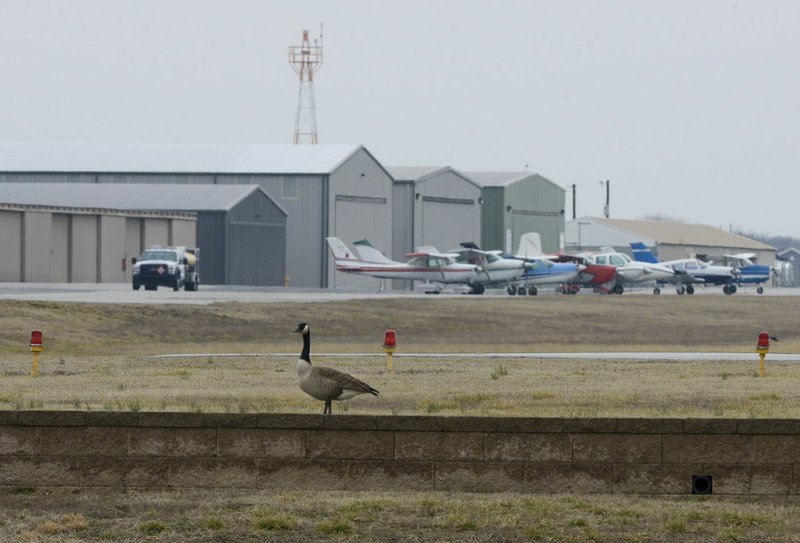BENTONVILLE -- Summit Aviation officials pressed for a timeline on when different nonlethal tactics will be used to combat the geese issue at the municipal airport during the Airport Advisory Board meeting Thursday.
Summit Aviation is the fixed-based operator at the airport.
By the numbers
There have been about 194,000 incidents of planes hitting wildlife in the United States between 1990 and 2017, 14,400 of which were at 700 airports in 2017.
Source: Federal Aviation Administration
Geese typically spend about four months each spring at the airport, posing a safety hazard that could cause a plane crash, officials have said.
City administrators are taking the issue seriously and are looking at various nonlethal methods, said Chuck Chadwick, airport manager. The idea is to implement a tactic for a period of time and collect data on its success or lack thereof.
"We can talk about it until we're blue in the face," said Brad Elliott, Summit's general manager. "It sounds like nothing's going to get done" until someone is killed in a bird strike incident, he said.
There was a bird strike at the airport in January that caused more than $3,000 damage to the aircraft, Elliott said.
Elliott's comments came about halfway through a nearly hourlong discussion about the geese problem.
This is an issue the city has been discussing for at least the past five years, according to Bill Burckart, City Council member and former Airport Advisory Board member. He attended Thursday's meeting and encouraged the board to specify time frames to try different methods.
Chadwick told the board at its February meeting the city was seeking a permit from the Arkansas Game and Fish Commission allowing them to kill the geese. Public outcry halted the plan, sending city officials back to looking at options.
"The good part about it is that we're getting all sorts of ideas," he said Thursday of the email he and others have received.
Randy Claussen from Denver suggested trying The Goosinator, a remote-controlled, robotic "predator" that frightens geese. He sent an email to Octavio Sanchez, City Council member and Airport Advisory Board member.
Sanchez said he watched 30 minutes of videos illustrating the device's success.
Denis Birge, transportation engineer, has been asked to help to resolve the issue. He's using a laser as the first approach, Chadwick said.
The approach is inspired by nature, according to Bird-B-Gone, a California company selling bird control products.
"The birds perceive the approaching laser beam as a physical danger, which causes them to fly away," according to the company's website.
A couple of coyote decoys may be installed as early as next week, Chadwick said.
Board members earlier discussed other options such as using falcons to harass the birds.
"The issue with harassment is that it's expensive because it has to be constant," said Richard Ham, board chairman.
There may be Federal Aviation Administration grants that could be used, but the agency would require a 12-month study first, Chadwick said.
"It would provide us good data and information, but it doesn't give us an immediate resolution to the problem," he said. "I'm not sure there is an immediate resolution."
NW News on 03/15/2019

